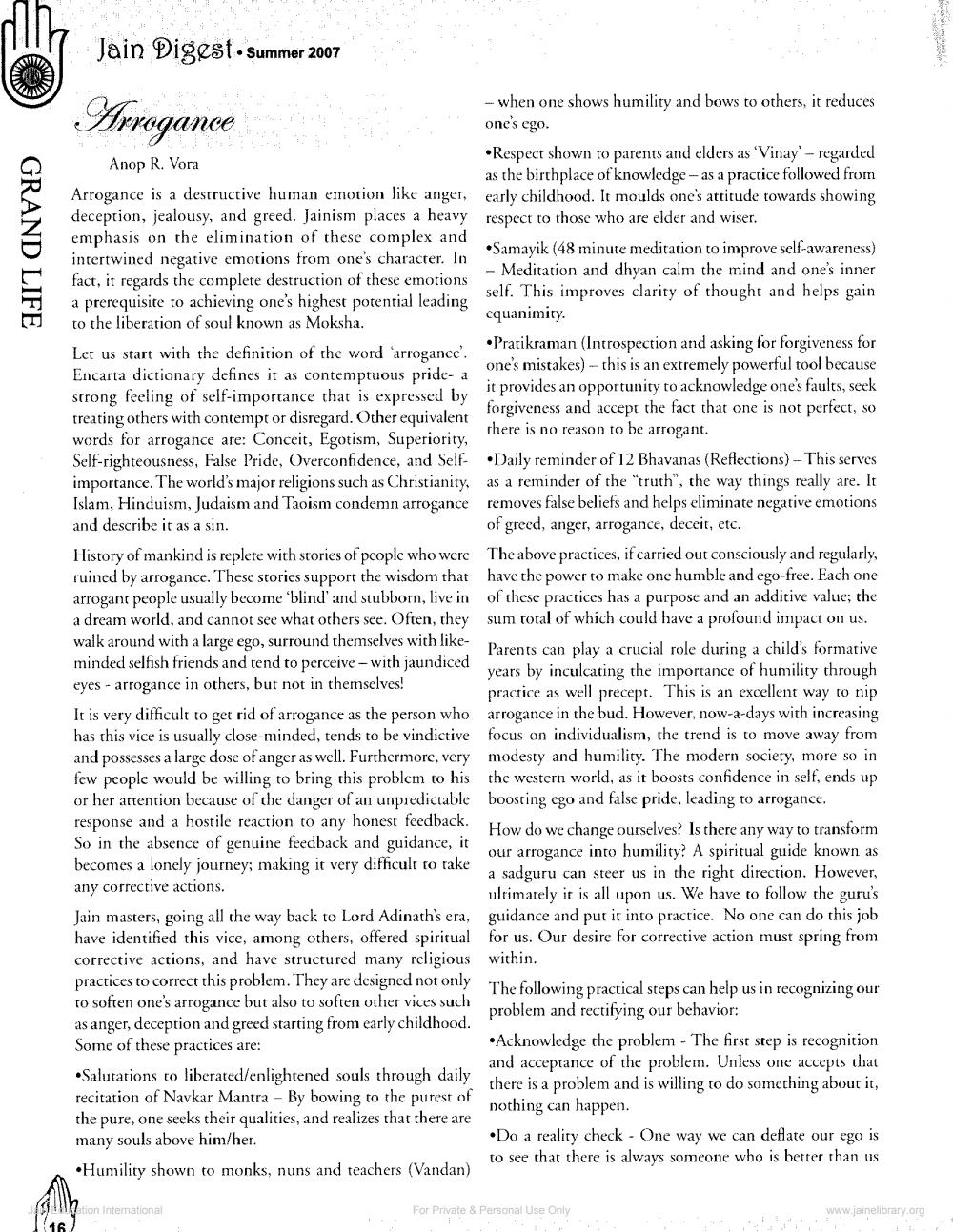________________
GRAND LIFE
Jain Digest-summer 2007
Arrogance
Anop R. Vora
Arrogance is a destructive human emotion like anger, deception, jealousy, and greed. Jainism places a heavy emphasis on the elimination of these complex and intertwined negative emotions from one's character. In fact, it regards the complete destruction of these emotions fact, it regards the complete destruction of these emotions a prerequisite to achieving one's highest potential leading
to the liberation of soul known as Moksha.
Let us start with the definition of the word 'arrogance'. Encarta dictionary defines it as contemptuous pride- a strong feeling of self-importance that is expressed by treating others with contempt or disregard. Other equivalent words for arrogance are: Conceit, Egotism, Superiority, Self-righteousness, False Pride, Overconfidence, and Self importance. The world's major religions such as Christianity, Islam, Hinduism, Judaism and Taoism condemn arrogance and describe it as a sin.
History of mankind is replete with stories of people who were ruined by arrogance. These stories support the wisdom that arrogant people usually become 'blind' and stubborn, live in a dream world, and cannot see what others see. Often, they walk around with a large ego, surround themselves with likeminded selfish friends and tend to perceive-with jaundiced eyes - arrogance in others, but not in themselves!
It is very difficult to get rid of arrogance as the person who has this vice is usually close-minded, tends to be vindictive and possesses a large dose of anger as well. Furthermore, very few people would be willing to bring this problem to his or her attention because of the danger of an unpredictable response and a hostile reaction to any honest feedback. So in the absence of genuine feedback and guidance, it becomes a lonely journey; making it very difficult to take
any corrective actions.
Jain masters, going all the way back to Lord Adinath's era, have identified this vice, among others, offered spiritual corrective actions, and have structured many religious
practices to correct this problem. They are designed not only to soften one's arrogance but also to soften other vices such as anger, deception and greed starting from early childhood. Some of these practices are:
Salutations to liberated/enlightened souls through daily recitation of Navkar Mantra - By bowing to the purest of the pure, one seeks their qualities, and realizes that there are many souls above him/her.
-- when one shows humility and bows to others, it reduces one's ego.
ation International
•Respect shown to parents and elders as 'Vinay' - regarded as the birthplace of knowledge-as a practice followed from early childhood. It moulds one's attitude towards showing respect to those who are elder and wiser.
Samayik (48 minute meditation to improve self-awareness) - Meditation and dhyan calm the mind and one's inner self. This improves clarity of thought and helps gain
equanimity.
•Pratikraman (Introspection and asking for forgiveness for one's mistakes) -- this is an extremely powerful tool because
it provides an opportunity to acknowledge one's faults, seek forgiveness and accept the fact that one is not perfect, so there is no reason to be arrogant.
Daily reminder of 12 Bhavanas (Reflections) -- This serves as a reminder of the "truth", the way things really are. It removes false beliefs and helps eliminate negative emotions of greed, anger, arrogance, deceit, etc.
The above practices, if carried out consciously and regularly, have the power to make one humble and ego-free. Each one of these practices has a purpose and an additive value; the sum total of which could have a profound impact on us. Parents can play a crucial role during a child's formative years by inculcating the importance of humility through practice as well precept. This is an excellent way to nip arrogance in the bud. However, now-a-days with increasing focus on individualism, the trend is to move away from modesty and humility. The modern society, more so in the western world, as it boosts confidence in self, ends up boosting ego and false pride, leading to arrogance. How do we change ourselves? Is there any way to transform our arrogance into humility? A spiritual guide known as sadguru can steer us in the right direction. However, ultimately it is all upon us. We have to follow the guru's guidance and put it into practice. No one can do this job for us. Our desire for corrective action must spring from within.
a
The following practical steps can help us in recognizing our problem and rectifying our behavior:
•Acknowledge the problem - The first step is recognition and acceptance of the problem. Unless one accepts that
there is a problem and is willing to do something about it, nothing can happen.
⚫Do a reality check - One way we can deflate our ego is Humility shown to monks, nuns and teachers (Vandan) to see that there is always someone who is better than us
For Private & Personal Use Only
www.jainelibrary.org




